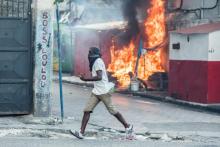Intense Gang Violence Displaces over 1,200
In recent days, 1,200 Haitians have been displaced by gang violence. The Kenyan-led security force is under-staffed and under-equipped for pushing back gangs let alone holding cleared neighborhoods. Even if they could, it is a temporary measure until there is an effective, accountable government in place. So far the Transitional Presidential Council is remarkable only for the level of infighting. Residents of contested neighborhoods lack food, water, and health care. Reaching them is challenging for even the most professional humanitarian organisations. Despite all this, other countries continue to send flights of deportees to Haiti which is reprehensible. Read the fhe full article linked and below for more information.





